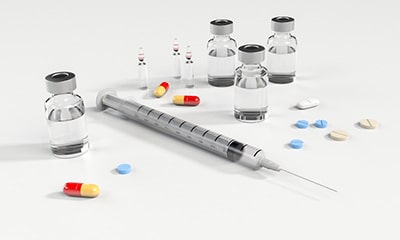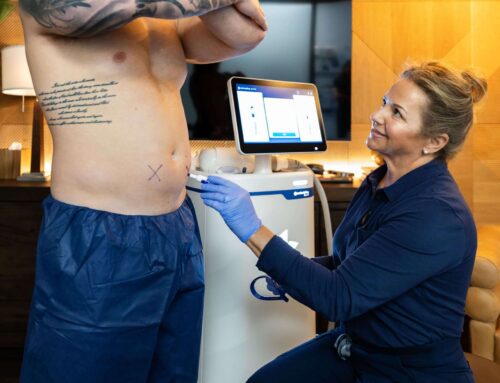 There’s yet another fad diet making headlines: HCG for weight loss. The eight-week HCG diet blends an ultra-low calorie intake with the use of HCG—a hormone the placenta naturally produces during pregnancy. Supporters claim using HCG for weight loss will “reset your metabolism,” so that you lose as much as a pound a day without feeling hungry or weak. Sound too good to be true? Read on and judge for yourself.
There’s yet another fad diet making headlines: HCG for weight loss. The eight-week HCG diet blends an ultra-low calorie intake with the use of HCG—a hormone the placenta naturally produces during pregnancy. Supporters claim using HCG for weight loss will “reset your metabolism,” so that you lose as much as a pound a day without feeling hungry or weak. Sound too good to be true? Read on and judge for yourself.
HCG for Weight Loss
The HCG diet is built on taking a daily dose of the hormone HCG: human chorionic gondadotropin. The US Food and Drug Administration (FDA) has approved HCG as a prescription drug for the treatment of female infertility. It has not, however, approved HCG for weight loss.
Consumers are able to purchase a homeopathic version of HCG over the counter (OTC) that is advertised as a weight-loss solution. It is recommended with a very low-calorie diet, but the FDA advises that these options are not safe. Companies that sell them are, thus, breaking the law.
Ultra-low-calorie Diets
 During the eight-week HCG diet, you’ll be restricted to just 500 calories a day. You’ll also be limited to specific foods—and only during lunch and dinner. Each meal includes one protein, one vegetable, one fruit, and one bread from a short list of approved foods. For example, there are only four approved fruits, and bread can include one piece of melba toast or one breadstick. When using HCG for weight loss, you can drink unlimited amounts of coffee, tea, and water, and you can have up to 1 tablespoon of milk per day.
During the eight-week HCG diet, you’ll be restricted to just 500 calories a day. You’ll also be limited to specific foods—and only during lunch and dinner. Each meal includes one protein, one vegetable, one fruit, and one bread from a short list of approved foods. For example, there are only four approved fruits, and bread can include one piece of melba toast or one breadstick. When using HCG for weight loss, you can drink unlimited amounts of coffee, tea, and water, and you can have up to 1 tablespoon of milk per day.
 Not only can it be uncomfortable to consume just 500 calories a day—just one-fourth of the recommended 2,000 calories a day, per US dietary guidelines—it can also be dangerous. Doctors typically recommend less-than-1,000-calorie diets for obese patients or those with a specific medical condition, such as high blood pressure. Such diets are closely supervised.
Not only can it be uncomfortable to consume just 500 calories a day—just one-fourth of the recommended 2,000 calories a day, per US dietary guidelines—it can also be dangerous. Doctors typically recommend less-than-1,000-calorie diets for obese patients or those with a specific medical condition, such as high blood pressure. Such diets are closely supervised.
That’s because it’s just not possible to meet your nutritional needs with so few calories. A restricted diet affects your energy level as well as your body’s ability to function properly. A diet that low in calories puts you at risk for malnutrition. It’s like short-term starvation.
Health Risks of HCG for Weight Loss
Severely restricting calories—and nutrition—can put you at risk for a variety of health symptoms. Irregular heartbeat, nausea, constipation, dizziness, and gallstone formation are just a few. Specific side effects when using HCG for weight loss also include fatigue, irritability, depression, fluid buildup in the body, and gynecomastia—the growth of breasts in men and boys.
In addition, sustaining weight loss following a severe restriction of calories is difficult. Once you resume eating more calories, the weight generally comes back.
Frankly, manipulating hormones without the supervision of a doctor is risky. Some research has linked the OTC HCG weight-loss products to an increased risk of certain types of cancers. Breast cancer and prostate cancer are both linked to an imbalance of hormones in the body.
The Bottom Line
The lasting question is: Is using HCG for weight loss too good to be true?
Science says any super-low-calorie diet will result in weight loss. And most studies have found that using HCG for weight loss has nothing to do with the resulting drop in pounds. It’s all about the calorie restriction.
If you’re looking for a safe, proven, lasting way to firm up your stubborn areas, check out CoolSculpting, the #1 non-invasive fat-reduction procedure on the planet. And Bodify is the #1 CoolSculpting provider in Arizona. You can rest easy knowing that you’re in good hands, and you’ll experience a tried-and-true treatment that works.






